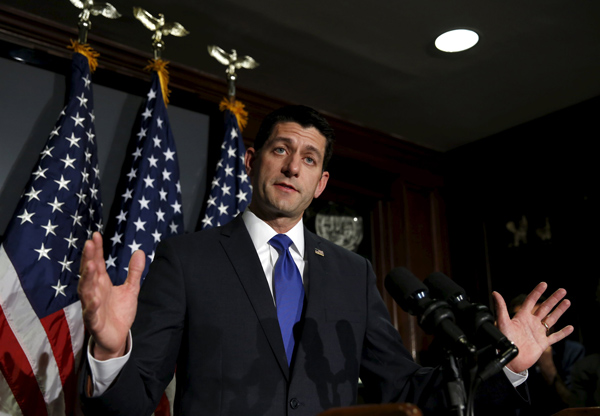US House Speaker Paul Ryan rules out presidential bid
(Xinhua) Updated: 2016-04-13 09:18
 |
|
US House Speaker Paul Ryan makes a statement to the media on Capitol Hill in Washington ruling himself out as a potential 2016 presidential candidate April 12, 2016. [Photo/Agencies] |
"Let me be clear: I do not want, nor will I accept the nomination for our party," he said in a statement at the Republican National Committee's headquarters on Capitol Hill, reiterating that he believes the Republican nominee for president should only be chosen from among those candidates already running.
"I simply believe that if you want to be the nominee for our party -- to be president -- you should actually run for it. I chose not to do this. Therefore, I should not be considered," he told Republican delegates.
"Count me out," said the top Republican in Congress, dashing hopes of many Republicans who are in despair over the party's top two presidential hopefuls Donald Trump and Ted Cruz. Both GOP candidates are feared to lose in the general election, bringing the party into widening divisions.
Anti-Trump Republicans have suggested that if the party's front-runner Trump falls short of the necessary 1,237 delegates, he might be stopped at the first ballot at the nominating convention in July, giving delegates a chance to choose a consensus alternative.
Speculation has run high recently as Ryan delivered a high-profile speech later last month, calling for the unity of the Republican Party via decent political dialogue in the primary race.
Ryan was reluctant to accept the Speaker's role after former Speaker John Boehner unexpectedly announced his retirement last fall. Some Republicans wish he would change his mind again as a brokered Republican convention is looming following Cruz's victory over Trump in Wisconsin on April 5.
Ryan, 46, won his House seat in 1998 when he was 28. He was chosen by Republican nominee Mitt Romney as his running mate on the GOP ticket in 2012 and gained national attention for his proposals to overhaul Medicare, the national social insurance program, and restructure the tax code. He returned to the House after the 2012 defeat. He assumed office as Speaker of the US House of Representatives in October 2015.







